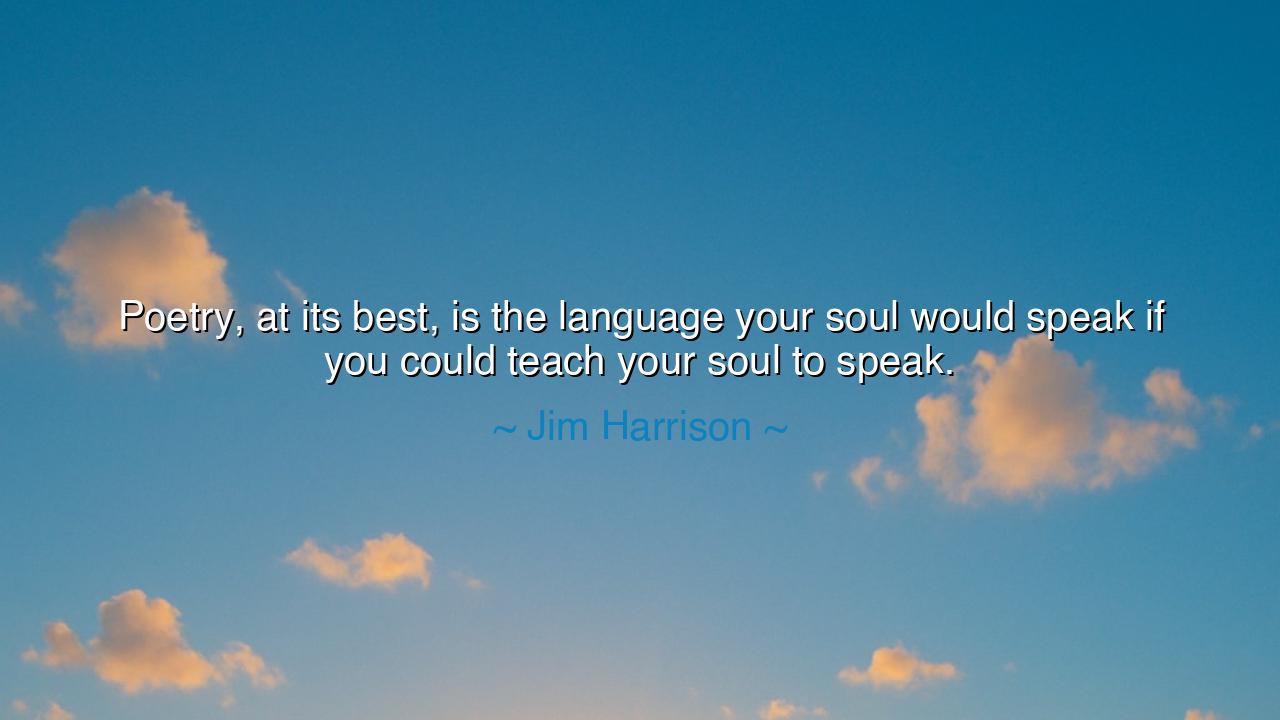
Poetry, at its best, is the language your soul would speak if
Poetry, at its best, is the language your soul would speak if you could teach your soul to speak.






Jim Harrison, poet of the wild heart, once declared: “Poetry, at its best, is the language your soul would speak if you could teach your soul to speak.” In this vision, he reminds us that poetry is not mere decoration, not simply the clever arrangement of words, but something deeper—an utterance that comes from the eternal core of our being. It is the hidden tongue of the spirit, brought into form through rhythm, image, and sound. Poetry, then, is not the speech of the mind, but the cry of the soul clothed in human words.
The meaning of his words is profound. Most of us stumble through life speaking in the language of necessity—numbers, commands, explanations, and arguments. But the soul longs for a different kind of expression. It longs to speak in the language of longing, of love, of grief, of ecstasy. When a poet finds the right words, it is as though the soul has been given a voice. In such moments, readers feel their own spirits stirred, because they recognize in those lines something they themselves have felt but never known how to say.
This has been true since the dawn of civilization. The psalms of David, the hymns of Sappho, the chants of the Vedas—all were not just words, but living breaths of the soul. They spoke of human anguish and divine wonder, of mortality and eternity, in ways no ordinary speech could contain. Poetry was—and still is—the bridge between what is felt in silence and what can be shared aloud. Harrison’s wisdom echoes this ancient understanding: poetry is the human attempt to let the soul’s own tongue be heard in the world.
History provides many luminous examples. Consider Rainer Maria Rilke, who in his Duino Elegies gave voice to loneliness, to the terror of existence, to the awe of beauty. His verses were not crafted merely by intellect; they poured from his soul, so much so that readers even today feel their innermost depths awakened. Or think of Emily Dickinson, who wrote in seclusion, yet spoke in such piercing language that her words became the eternal whisper of countless souls. Each proved that poetry at its best is not written from the outside in, but from the inside out.
The truth Harrison names is both heroic and humbling: each human soul carries a language of its own, but not all can bring it forth. To write, or even to read, poetry is to step into this sacred space where silence takes on form. It is the practice of teaching the soul to speak, and in listening, to hear what lies beneath the noise of daily life. Poetry is thus not only art but revelation.
The lesson for us is clear: do not treat poetry as distant or ornamental, but as the very language of your inner being. Approach it not only with your mind, but with your heart wide open. When you read poetry, listen as if your own soul were speaking back to you through the lines. When you write, do not force cleverness—let your spirit breathe itself into words. Poetry becomes powerful only when it is authentic, when it is born from the depths.
Practical action flows from this wisdom. Read a poem slowly, aloud, letting the rhythm move through you. Memorize verses that stir you, so your soul has words ready when silence grows heavy. Write your own lines, even if rough and unpolished, for in them your inner self will begin to find its voice. Keep a journal of moments that feel unspeakable, and then try to speak them—this is the exercise of teaching your soul to speak.
Thus Harrison’s wisdom endures: “Poetry, at its best, is the language your soul would speak if you could teach your soul to speak.” Treasure this truth. For when you listen to poetry, you are not merely hearing words—you are hearing the hidden heart of humanity, and perhaps, the eternal voice of your own soul.






YDYen Do
I find this quote fascinating because it implies that poetry is the purest form of communication. It’s not just an art form; it’s the language of the soul itself. But how do we translate these profound, wordless emotions into poetry? Is the act of writing poetry a way of connecting with our truest self, or does it reflect a struggle to articulate what we deeply feel but can’t always express?
TMTam Minh
Harrison’s words make me reflect on how often we struggle to find words for our innermost feelings. If poetry truly is the language our soul would speak, then why do some people find it so difficult to connect with poetry on this level? Is it a matter of perspective, or is poetry only truly understood by those who can recognize that deeper, almost spiritual connection? How do we open ourselves to it?
ANAnh Nguyen
This quote made me think about how poetry can act as a channel for emotions we can’t easily express otherwise. It’s almost like poetry gives a voice to the parts of ourselves we don’t often access. But is this universal for everyone, or is it something only some people experience? Could it be that some people have a harder time connecting to their 'soul’s language' through poetry, and if so, why?
NQdoan nguyen nhu quynh
Jim Harrison’s quote beautifully suggests that poetry is more than just words—it's the deepest expression of our soul. I wonder, though, can we really teach our soul to speak, or is poetry the closest we can get to expressing that inner language? How often do we feel disconnected from our true selves, and can poetry help bridge that gap? What is it about poetry that allows it to speak so deeply to us?